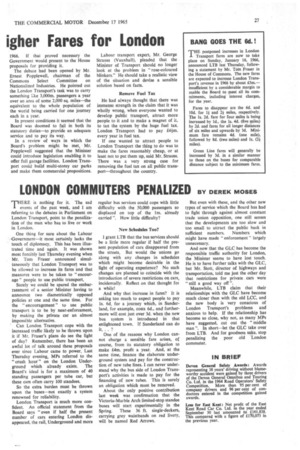igher Fares for London
Page 29

If you've noticed an error in this article please click here to report it so we can fix it.
1966. If that proved necessary the Government would present to the House proposals for providing it.
The debate had been opened by Mr. Ernest Popplewell, chairman of the Commons Select Committee on Nationalized Industries. He pointed out the London Transport's task was to carry something 1:ke 3,000m. passengers a year over an area of some 2,000 sq. miles—the equivalent to the whole population of the world being carried for one journey each in a year.
In present conditions it seemed that the Board was doomed to fail in both its statutory duties—to provide an adequate service and to pay its way.
In a review of ways in which the Board's problem might be met, Mr. Popplewell suggested that the Minister could introduce legislation enablitig it to offer full garage facilities. London Transport could build multi-storey car parks and make them commercial propositions. Labour transport expert, Mr. George Strauss (Vauxhall), pleaded that the Minister of Transport should no longer look at the problem in "rose-coloured blinkers." He should take a realistic view of the situation and devise a sensible solution based on facts.
Remove Fuel Tax He had always thought that there was immense strength in the claim that it was wholly wrong, when everyone wanted to develop public transport, attract more people to it and to make a magnet of it, to tax the system by the huge fuel tax. London Transport had to pay £41m. every year in fuel tax.
If one wanted to attract people to London Transport the thing to do was to make the fares reasonably cheap, or at least not to put them up, said Mr. Strauss. There was a very strong case for removing the fuel tax on all public transport—throughout the country.












































































































